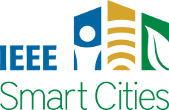January 2022
Smart Cities January eNewsletter - Empowering Energy Citizens and Energy Communities for Smart Cities - Part 1
For a downloadable copy of this eNewsletter, please visit the IEEE Smart Cities Resource Center.
Resource Center Update: Improved user experience for IEEE members! Access/Download free products without a checkout process.
Written by Shafi Khadem, Guest Editor
While empowering citizens by turning them from passive to energy active consumers, implementing smart appliances in smart buildings, introducing energy trading/sharing with neighbours, developing new local energy market mechanisms and creating energy communities, the development of integrated technologies/energy systems are some of the most important areas in the formation of smart cities, the innovative smart energy solutions and integrations at the community level can be replicated at the city level. This special issue of the IEEE Smart Cities eNewsletter focuses on the innovations that are being approached by the stakeholders, developing and demonstrating to empower the energy citizens and forming smart energy communities towards the development of decarbonized smart grids and cities. This month, four articles have been presented that address different challenges within the area of peer-to-peer energy trading, advanced measurement and monitoring systems, data analytics, implementation of blockchain technology, multi-vector energy trading, and SCADA system.
Written by Fatuma Ali, Juan Pablo Cárdenas Álvarez, Ana Trbovich, Andrea Bertolini, Juan Manuel España, and Santigo Ortega
In 2021, the Transactive Energy Colombia Initiative and Grid Singularity collaborated to introduce peer-to-peer (P2P) energy trading to the Medellin pilot project, which previously operated through community trading with differentiated net billing. Local aggregator NEU connected live consumption and generation data from the Medellin pilot to the Grid Singularity Exchange via an interoperable API and different scenarios were simulated. We found that even under the current net-metering pricing scheme in Colombia, P2P trading would reduce energy bills up to 7% and improve the self-sufficiency and self-consumption values by 18.2% and 51.6%, respectively. This shortens the payback period for investing in residential photovoltaics (PV) for several low-income prosumers. While applying demand side response mechanisms reduced the participants’ energy bills, the high investment costs of residential batteries rendered it financially unviable for low-income prosumers. These results should encourage Colombian regulators to allow P2P trading, improve the choice of energy tariffs and suppliers, and enhance access to affordable renewable energy assets for low income households, in order to accelerate the adoption of local energy markets and individual contribution to energy transition.
Written by Elizabeth Massey1 and Sarah Valovcin2
Utilities of all sizes are facing a world of systems with more complex technology and greater quantities of data, whether from Advanced Metering Infrastructure (AMI), Geographic Information Systems (GIS), or other platforms. Rather than simply installing new and complex systems and hoping for positive results, those utilities that can properly manage these systems and derive tangible value from the data and for their customers will have a distinct competitive advantage in the future.
Written by Chandra Prakash Barala, Aaquib Firdous, Sumanth Yamujala, Parul Mathuria, and Rohit Bhakar
Energy systems are transforming towards decentralized operations, resulting in high penetration of Distributed Energy Resources (DERs). However, these localized generation pockets increase operational stress on upstream grids, with reverse power flow and reactive power control challenges. This necessitates additional network investment to ensure system security. Local energy management of DERs can minimize upstream grid feed-in and mitigate investment requirements. Neighbourhood energy sharing offers an effective technique for consumption of locally produced energy, as certain technologies like cogeneration, Power-to-Gas (P2G) and Power-to-Heat (P2H) are amenable to conversion, trade, and storage of various forms of energy in neighbourhoods. This requires a secure market framework where producers and consumers can negotiate and execute energy trades. Analogous to Peer-to-Peer (P2P) electricity trade, multi-energy P2P facilitates trading of various energy vectors like electricity, heating, cooling, and gas to meet diverse energy demands and limit carbon footprints. However, such a market mechanism must be complemented with a centralized entity and requires significant computations to be handled. Integrating Blockchain technology and smart contracts with the P2P trading can allow customers to buy-sell energy from each other in a decentralized way, without the need for a centralized entity to coordinate. In this work, we provide an overview of blockchain technology based multi-vector energy trading in smart-neighbourhoods to promote local energy balance.
Written by Hady H. Fayek, and Omar H. Abdalla
The world is targeting 100% green electricity by 2050, which is turning the power system to be even more complex with a high degree of variability in terms of both generation and demand. In addition, living in the era of smart cities and energy communities, the consumer can be a part of both energy production and consumption. Therefore, the conventional techniques of measurements using point-to-point supervisory control and data acquisition (SCADA) systems will not be sufficient in smart grid applications. Consequently, Wide Area Measurement Systems (WAMS) are required for measuring voltage and current as phasors in real-time basis. In this study, an optimal WAMS configuration is applied to a model representing the 500/220 kV Egyptian grid, considering the regional boarders and the grid code with a technical and financial solution of the whole grid in different operating conditions.
To have the eNewsletter delivered monthly to your inbox, join the IEEE Smart Cities Community.
Past Issues
To view archived articles, and issues, which deliver rich insight into the forces shaping the future of the smart cities. Older eNewsletter can be found here. To download full issues, visit the publications section of the IEEE Smart Cities Resource Center.



